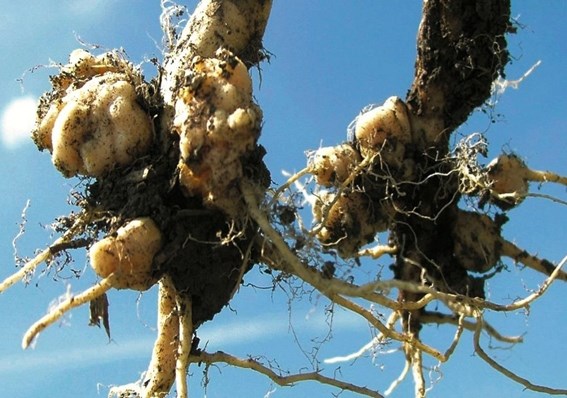The MD of Bonnyville is planning on hosting another producers meeting, with the goal of providing farmers in the region with more information on how to prevent the invasion of clubroot.
Officials with the MD have been hard at work over the past few months drawing up a plan on how the municipality should best deal with the recent findings of clubroot.
Another meeting with local farmers in the region has tentatively been set for Feb. 1, and will see a variety of speakers come in to educate them on clubroot and the preventative measures available.
“Some of my recommendations will be as they always are: a four-year rotation on canola crops and using clubroot resistant varieties only,” said Janice Boden, an agricultural fieldman with the MD of Bonnyville.
Boden and her peers will also take the time to explain the recent clubroot policy that was put in place by the MD of Bonnyville.
Council gave the new policy the green light during a meeting on Nov. 25, after receiving input from a variety of major canola producers in the region. Under this new policy the MD can carry out random inspections in fields by council-appointed inspectors.
“By having this proactive policy in place we'll reduce the spread from those two locations that we presently have and hopefully it won't spread to any further locations with the restrictions that are being put in place in there,” said Matt Janz, director of agriculture for the MD.
Any farmers found to be in contravention of the policy can have their field destroyed.
Clubroot, a serious soil disease found predominantly in canola crops, was initially spotted in late March on a farm on the border of the MD of Bonnyville and County of St. Paul.
It was then spotted later on in the summer in another field within the MD of Bonnyville, causing many in the local agricultural community concern.
“It is popping up all over,” said Boden. “Smoky Lake had it in an additional 15 fields. Two Hills had it in an additional five and St. Paul had it in an additional three field this year.”
Clubroot can cause major headaches for producers if a crop contracts the disease as there is no way to completely get rid of the disease and it will stay in the soil for approximately 20 years.
Unless famers are willing to remove the top 20-feet of topsoil and haul in new topsoil, a move that is extremely expensive, they will continue to have the disease present while following a four-year rotation.
“If they get clubroot their crops are done. For the next 20-years they are not planting canola there,” said Dave Bodker od Newpark Mating and Integrated Services.
“Canola is one of the largest crops in Alberta. We are one of the major suppliers of canola. If this continues it could wipe out that area for us. It is going to have significant economic impacts right across the board.”
Bodker has been talking to municipalities across the province who have recently started dealing with clubroot in hopes of educating them on the options available to help prevent the spread of the disease.
“While farmers can't outright refuse someone from entering their land they can put stipulations or conditions down on the entrance of their land in order to prevent (clubroot) from spreading,” said Bodker.
According to Boden several MD hunters went up north to hunt on fields they had been going to for years and were refused entry due to the recent clubroot outbreak in the MD of Bonnyville.
Some stipulations farmers have put in place include building washing stations outside their land and forcing all equipment that comes through to be thoroughly washed down before entering.
Bodker says there are even options for industry, such as companies building pipelines to do their part and help prevent the spread of clubroot.
Currently companies that use wood access mats have a very good chance of transferring clubroot spores from region to region through those mats. There are new mats out there, which are sealed and can prevent the transfer of spores.
A variety of information and options available to famers will be presented at the upcoming clubroot meeting in early 2016.
“I would hope that we can get that message to our producers to ensure that whoever they are allowing on their lands is doing due diligence in regards to not spreading the disease,” said Boden.
Farmers can also expect the MD to be conducting regular field-testing on every single canola field in the municipality to ensure the disease doesn't spread through the region.



